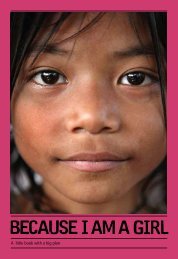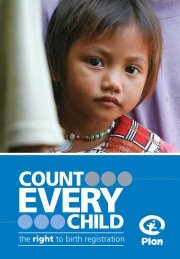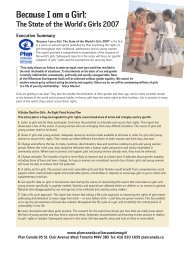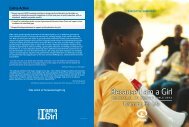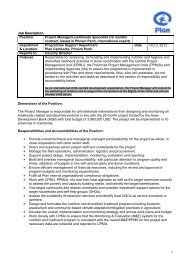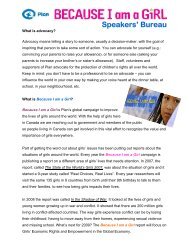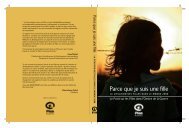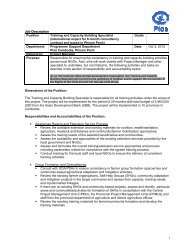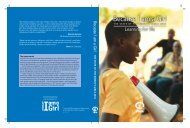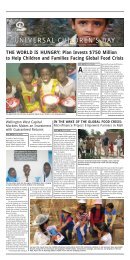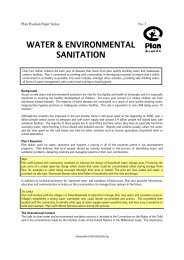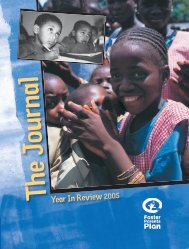Plan Worldwide Annual Review and Combined Financial ...
Plan Worldwide Annual Review and Combined Financial ...
Plan Worldwide Annual Review and Combined Financial ...
Create successful ePaper yourself
Turn your PDF publications into a flip-book with our unique Google optimized e-Paper software.
<strong>Plan</strong>’s global spend in 2012<br />
€71 million<br />
Malawi<br />
Youth-run TV programme champions<br />
girls’ rights<br />
El Salvador<br />
Young people promote a culture<br />
of peace<br />
Sierra Leone<br />
Young people become part of the<br />
solution in local governance<br />
CHILD PARTICIPATION<br />
In Malawi, a new youth TV programme called ‘Timveni’<br />
(Let it be heard), funded by <strong>Plan</strong> Sweden, is giving a<br />
voice to thous<strong>and</strong>s of teenage girls. Girls in Malawi<br />
often face early or forced marriage or abusive cultural<br />
practices. Many have to walk long distances to get<br />
safe water or drop out of school because of poverty.<br />
Young peer journalists encourage the girls to tell their<br />
own stories, uncovering cases of rape, abuse <strong>and</strong> forced<br />
marriage. They then hold government to account for<br />
responding to the crimes they expose <strong>and</strong> protecting<br />
citizens’ rights.<br />
The half-hour show, broadcast weekly on Television<br />
of Malawi Broadcasting Corporation from its own<br />
state-of-the-art production studio, is one of the first<br />
peer-produced youth programmes in Africa. The young<br />
people involved – mostly girls – are also part of a sister<br />
radio project, launched by <strong>Plan</strong> in 2006.<br />
“Our new television licence will help Malawian<br />
young people to fully participate <strong>and</strong> express<br />
themselves freely about developmental issues,”<br />
says Timveni’s Executive Director, Many<strong>and</strong>a Nyasulu.<br />
“Timveni TV will enable us to reach out to more<br />
children <strong>and</strong> young people, promoting their rights,<br />
talents, life skills <strong>and</strong> education. We will continue<br />
to involve vulnerable children – particularly girls,<br />
as well as young people with disabilities – <strong>and</strong><br />
promote their skills <strong>and</strong> talents.”<br />
Six years ago, Mario was a street kid, involved in gangs,<br />
alcohol <strong>and</strong> drugs. But today, he is a radio broadcaster<br />
<strong>and</strong> vice president of a youth organisation, studying for<br />
a degree in education.<br />
“I was a kid with no dreams, without a vision,”<br />
he says. But when he joined the <strong>Plan</strong>-supported<br />
youth group, called AJOCHT, Mario’s perspective<br />
began to change. “My friends in AJOCHT awakened<br />
social responsibility in me,” he explains. AJOCHT<br />
president Alfredo, 22, comes from a similar background.<br />
“Participating in decision making has changed me,”<br />
he says. “I learned how to talk to public officials<br />
<strong>and</strong> dem<strong>and</strong> my rights, to fulfil my responsibilities<br />
<strong>and</strong> fight injustice. I feel motivated!”<br />
There is no doubt that their community needs their<br />
help, with high rates of domestic violence, abuse<br />
<strong>and</strong> sex crimes. AJOCHT’s activities include a life-skills<br />
course called Youth: Your Voice Counts, which aims to<br />
prevent violence <strong>and</strong> build a culture of peace. Last year<br />
510 seventh, eighth <strong>and</strong> ninth grade students attended<br />
the course, developing a public awareness campaign<br />
which included street theatre, murals <strong>and</strong> media<br />
messages. The aim is for 2,000 students to complete it.<br />
AJOCHT does its own fundraising, supported by local<br />
individuals, NGOs <strong>and</strong> businesses. <strong>Plan</strong> will continue its<br />
support in 2013.<br />
In Sierra Leone, local decision-making bodies are<br />
often run by traditional elders who view young people<br />
as arrogant <strong>and</strong> violent. Frustrated, alienated <strong>and</strong><br />
unemployed, many young people resort to drugs<br />
<strong>and</strong> prostitution. <strong>Plan</strong>’s Youth in Governance<br />
programme, funded by <strong>Plan</strong> UK <strong>and</strong> the UK<br />
government, supported 900 vulnerable young<br />
people (44 per cent of them female) to get involved<br />
in local government activities. <strong>Plan</strong> organised them<br />
into 36 youth groups, training them to help in projects<br />
such as maintaining water points, collecting taxes<br />
<strong>and</strong> taking part in district council meetings. They also<br />
participated in livelihood projects, using seeds <strong>and</strong><br />
tools donated by the Ministry of Agriculture.<br />
Today, most of the youth groups have remained<br />
active <strong>and</strong> are officially registered, with their own<br />
bank accounts. Many young people are pursuing<br />
higher education or training, or have been elected<br />
to governing councils <strong>and</strong> are actively engaging<br />
in community development. “I now have selfconfidence,”<br />
says one group member. “I’m a<br />
member of our Ward Committee <strong>and</strong> I attend<br />
council meetings. I have authority!”<br />
“This project transformed the lives of these young<br />
people <strong>and</strong> made them realise that they have<br />
hidden potential that can make them role models<br />
in society,” says Patrick Mahoi of <strong>Plan</strong> Sierra Leone.<br />
23



